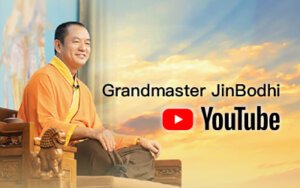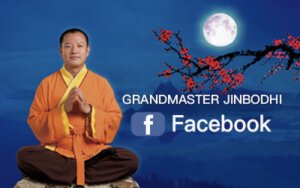You are not alone if you find yourself under constant stress and unable to get a good night’s rest. Life stressors, from work to finances to family; traffic jams, challenging coworkers, and marital issues, are among the top causes of insomnia. Many of the stressors we confront in contemporary life elicit our fight-or-flight reaction, and thanks to modern technology much of what used to be downtime is now spent overstimulating our visual and auditory processing abilities. Along similar lines, prolonged stress exposure without relaxation may lead to reduced sleep duration and lower quality sleep.
As the pace of modern life and our information exposure increases exponentially, it’s no surprise that over 40% of people in the US aren’t getting enough sleep. But guided meditation for sleep problems and insomnia is among the most effective ways to enhance sleep quality and deal with chronic stress.
How Chronic Stress Can Affect One’s Ability to Sleep
The body’s hormonal stress response is set off by any perceived threats or dangers, whether physical or psychological. Stress hormones like cortisol give your body a surge of energy so you can fight against or flee from an immediate threat. Muscles tense up, heart rate quickens, blood pressure increases, and breathing accelerates – these physical changes are supposed to be a temporary boost to your strength, stamina, reflexes, and focus.
But this boost of adrenaline and heightened awareness comes at a cost: a stress response system that is activated for prolonged periods of time can disrupt almost all bodily processes – this is chronic stress.
In a healthy stress response, the hypothalamic-pituitary-adrenal (HPA) axis is responsible for decreasing cortisol and ending the stress response. The HPA axis is also crucial in managing the sleep-wake cycle. Therefore, it is easy to understand why chronic stress has been linked to hyperactivity in the HPA axis, less sleep, less rapid eye movement (REM) sleep, and lower delta power, all of which contribute to sleep disruptions, memory loss, and impaired mood regulation.
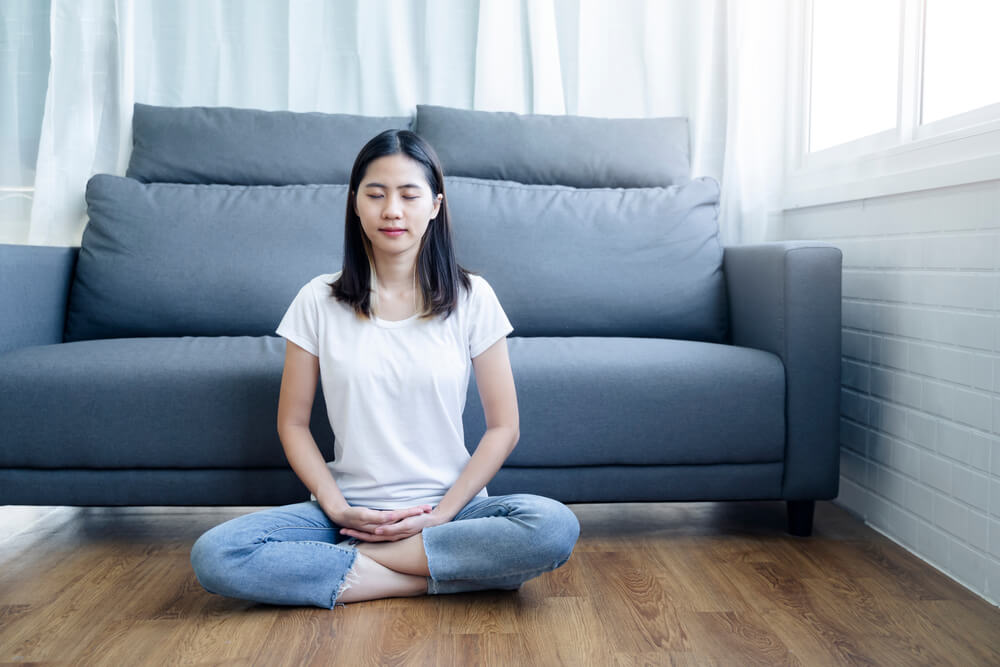
Reduce Stress With Meditation for Sleep Problems
This ‘relaxation response’ can be thought of as the antithesis of the stress response, which is a major cause of insomnia.
Insomnia is sometimes understood to be a state of hyper-arousal, in contrast to the process of falling asleep, which entails a progressive decrease in arousal. When we are under emotional strain, such as stress, depression, or anxiety, our brains remain “wired,” making it more difficult to fall asleep. Because we begin to link going to bed with anxiety about being unable to fall asleep, we contribute to the continuation of this state of tension over the long run.
Meditation for sleep problems can enhance the quality of sleep by providing cognitive resources to relax the nervous system before bed. As our heart rate and respiration slow down, the stress hormone cortisol reduces as well – this relaxation response can improve insulin resistance and diminish stress-related inflammatory responses and oxidative stress over the long term.
Meditation for sleep problems causes long-lasting changes in the brain, which might impact how well one sleeps. Research conducted on meditators with years of experience has shown that individuals have significant improvements in their slow-wave sleep and REM (rapid eye movements) sleep, as well as reduced awakenings throughout the night.
Managing Stress with Guided Meditation for Sleep Problems
If you’re having trouble sleeping and think stress could be to blame, try practicing relaxation methods before bed. We often turn to overstimulation or distractions from our emotions to cope with stress.
One research study indicated that coping mechanisms that lessen emotional avoidance are beneficial for mitigating the effect of stress on sleep delays. On the other hand, the coping mechanisms that heighten emotional avoidance, such as alcohol usage, may exacerbate sleep problems. Simple breathing exercises and meditation for sleep problems may help alleviate stress and tension in the body, decrease levels of stress hormones, and make it easier for you to fall asleep if you’re having trouble drifting off.
Other Methods That Can Help You Improve Sleep
Practicing guided meditation for sleep problems when combined with the following strategies, help you sleep more deeply and effectively at night:
Diet and Caffeine
Caffeine may excite your nervous system and prevent your body from entering a natural state of relaxation at night if it is ingested later in the day. For those who suffer from insomnia, it is better to avoid drinking tea after 2 pm. If you are suffering from severe insomnia, you should totally avoid drinking tea. Oolong tea and green tea are made of raw tea leaves. Take note of your tea-drinking time. Avoid drinking tea such as oolong after 2 pm. This kind of tea is high in caffeine; it makes you nervous and excited. Just like coffee, it keeps you awake.
In addition, eating late at night might have a detrimental impact on the quality of sleep and the natural release of melatonin. Similar problems are often brought on by drinking a lot of liquids before going to bed, even though some individuals are more susceptible to this than others. Frequent nocturnal urination, or having to go to the washroom more than twice a night, is referred to as nocturia by medical professionals. It has an impact on the quality of sleep as well as daytime energy.
Therefore, you should avoid consuming caffeine in the late afternoon or evening, not consume alcohol, not eat late in the evening, and not take any liquids before going to bed.
Regular Physical Activity
Coupled with practicing guided meditation for sleep problems, exercising is one of the most effective and science-backed strategies to enhance your health and quality of sleep. It can improve every facet of sleep and has been used to alleviate insomnia symptoms.
Even while regular exercise is crucial for getting a good night’s rest, doing it too late might make it difficult to fall or stay asleep. This is because physical activity has a stimulating impact, raising awareness levels and certain chemicals like epinephrine and adrenaline.
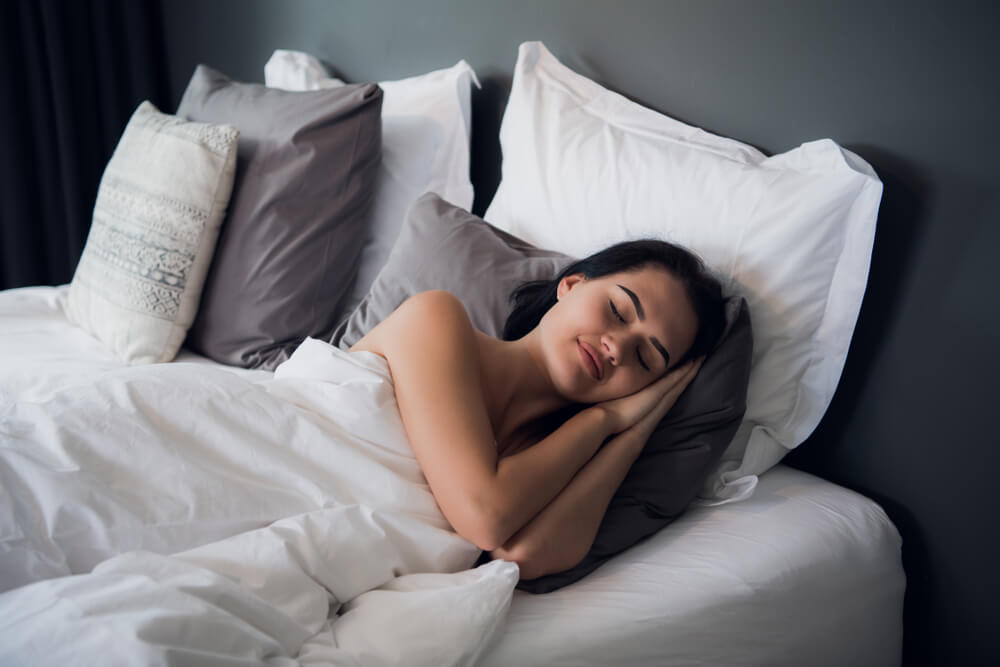
Bodhi Sleeping Beauty Tea
Grandmaster JinBodhi’s “Bodhi Sleeping Beauty Tea” recipe is a special sleeping tea formula with nutritious ingredients from Traditional Chinese Medicine. This tea helps to improve sleep, nourish completion, and calm nerves. It may be coupled with guided meditation for sleep problems to assist you in obtaining a restful night’s sleep.
This tea will help you get a better night’s sleep, fuel your body completely, and relax your nerves, and the recipe is both safe and beneficial for the vast majority of individuals. However, since various people have unique physical make-ups and particular situations, such as those who are already taking medicine, it is essential to check with a medical professional before beginning any new treatment.
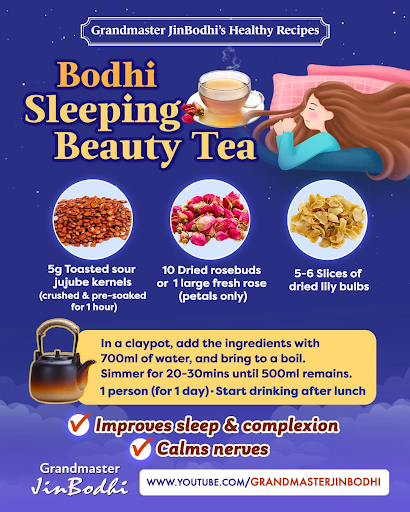
Grandmaster JinBodhi’s Healthy Recipe – Bodhi Sleeping Beauty Tea
Ingredients:
- 5g Toasted sour jujube kernels
- 10 Dried rosebuds or 1 large fresh rose (petals only)
- 5-6 slices of dried lily bulbs
Steps:
1. Crush the toasted sour jujube kernels and soak in a pot of 700ml of water for 1 hr
2. Add in other ingredients and bring to boil
3. Once the tea starts boiling, simmer for 20-30mins until 500ml remains. Once cool down to room temperature, pour into a carry-on bottle.
Note: It is recommended to use a clay pot for cooking
Servings: One person (1 day)
It is recommended to spread out the drinking throughout the day for better absorption.
Modify the recipe:
For people with cold hands and feet and a cold constitution, it is recommended to add 2 red dates after the jujube kernels. Dates are good for the spleen and stomach.
Bedroom Feng Shui
Is your bedroom feng shui affecting your sleep problems? Learn these two feng shui tips to help make your bedroom a more harmonious, relaxing space for good rest.
When we talk about feng shui, besides utility, there are also psychological and visual aspects. If there is a mirror, the benefit is that it is easy to look at yourself. It is very useful. However, at night, suppose you go to the bathroom or get up to do something. It is very dark, and you see yourself in the mirror; you might scare yourself. It might feel uncomfortable.
Have you experienced this? When it is very dark at night, and you see an image of a person in the mirror, are you scared? And when you go to the bathroom at night, you don’t want to turn on the light, right? If you don’t turn on the light, you will try not to look in the mirror. You are afraid to look in the mirror, right? Why? You may see something uncertain.
So my suggestion is that, in your bedroom, put as few mirrors as possible. Mirrors facing the bed should be covered with paper or a curtain. Unless you need to use the mirror when you are dressing up, bear in mind that the mirror is chasing you out of the room. So we should be careful of using mirrors.
Secondly, according to traditional Feng Shui, the left side of the bed is for the man, and the right side is for the woman. That is the Law of Nature. How do you tell which side is the left or the right? Should you look from outside into the master bedroom? Or should you look while lying on the bed? As the masters of the bedroom, get in the bed and you will know.
The man should sleep on the left side of the woman. According to the law of yin and yang, the left is reserved for yang. Ladies fall under the yin category, so they sleep on the right side. This aligns with the law of feng shui and Nature. This is to prevent conflicts between the couple.
We’ve Got the Best Stress Relief Retreat Around!
You may not get a good night’s rest if you’re always stressed out. Don’t forget to check out our tips for better sleep using meditation for sleep and anxiety!
For a long-term solution to sleep problems, trying out a stress relief retreat is a great first step.
The morning after attending a stress relief retreat, your body will feel more rested than usual. You won’t have any trouble staying up in the afternoon since you’ll have plenty of energy. Your physical, mental, and anxiety levels will decrease. Your mind will become clearer, your body will become more at peace, you will feel happier, your food will taste better, and you will sleep better. Get in touch today to sign up for our meditation retreats!
